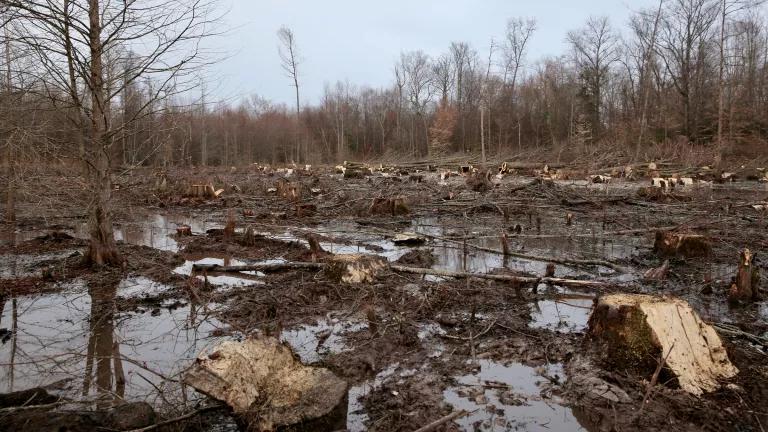Drax Makes a Mockery of International Day of Forests
Biomass producer Drax marked today’s International Day of Forests with a report extolling the logging and burning of forests for energy.

Dogwood Alliance
Today’s International Day of Forests is meant to celebrate the important role forests play for climate regulation, species protection, and the global community. Yet Drax – the world’s second largest wood-based biomass producer – chose this day to publish its annual report highlighting another year of burning wood pellets from logged forests. The company, which calls large areas of North American forests “fiber baskets,” refers to its operations as "sustainable” over 180 times in its report. This is in spite of evidence that producing, exporting, and burning forest pellets in industrial-scale power plants threatens our climate and biodiversity.
The new report shows that last year Drax sourced over 8 million tonnes of wood, burning almost 6 million tonnes of it in its North Yorkshire power station. Drax’s global wood supply came from:
- The United States (over 5 million tonnes), where logging for wood pellets in the U.S. Southeast is occuring in a global biodiversity hotspot.
- Canada (over 2 million tonnes), where recent investigations found new evidence suggesting that Drax’s 2023 operations sourced wood from threatened old-growth forests.
- Estonia (over 86 thousand tonnes), where investigations in 2022 found evidence indicating wood pellets were being sourced from forests containing habitat for rare and imperilled species.
- Portugal (over 35 thousand tonnes) where a new investigation revealed evidence indicating that wood sourced by a Drax supplier in the country has been clearcut from an ecologically important nature reserve.
The report also showed that:
- Drax produced 8% of the UK’s “renewable energy” needs across its biomass, hydropower, and pumped storage assets in the UK. However, the company’s massive emissions are grossly disproportionate to the relatively modest amount of energy it produces, with the company’s North Yorkshire plant making it the country’s single highest CO2 emitter in the power sector.
- Drax downplays the ability of cleaner forms of renewable energy to replace coal and gas plants as part of the clean energy transformation, stating that “wind, by its nature, is intermittent and generally unable to provide these vital system support services.” This is in spite of the fact that experts at the University of Oxford recently determined that wind and solar power could meet all of the UK’s energy needs within decades if given the right government incentives. Yet instead of taking full advantage of these opportunities, the UK is providing financial incentives to bioenergy with billions of taxpayer pounds. Drax implies that if they are just given a few more years, the industry will be able to develop and implement carbon capture technology to reduce their emissions, stating that the company will continue “to execute our strategy for carbon removals from BECCS in the US and UK by 2030.” But large-scale bioenergy with carbon capture and storage (BECCS) technology is very unlikely to materialise at the scale or timeline required to address the climate crisis. And even if it did, capturing the carbon at the power plant wouldn’t capture the large volume of logging, production, and transportation related emissions that occur before the pellets are even burned.
- Drax frames its energy source as a climate solution in its report, but in practice it ignores that the urgent timescale needed for emissions reduction is incompatible with logging forests for industrial-scale biomass production. Drax says, “The world must act now to address the climate crisis if we are to limit global warming to 1.5C above pre-industrial levels.” Yet studies have shown that it can take hundreds of years for new trees to grow to a point where the “carbon debt” caused by logging forests is recovered. That’s time the world does not have to avoid further catastrophic levels of warming.
- Drax’s profits jumped again, from £731 million in 2022 to £1.2 billion in 2023. However, Drax has already received – and may continue receiving – billions of pounds in “green” subsidies from the UK Government for burning wood from forests. Those subsidies end in 2027, but the UK government is considering renewing them. This prompted hundreds of scientists, politicians, and health and environmental experts from the UK, US and Canada to write to the Government urging them to change course and end subsidies for burning the world’s forests.
The theme of this year’s International Day of Forests – forests and innovation – shows the importance of protecting what we have left. In fact, over 130 organisations from around the world released a statement today, calling for accountability to stop ongoing global deforestation and forest degradation. But it is an energy technology - forest bioenergy - that is one of the greatest growing global threats to forests. We need old and mature forests to store carbon, provide habitat for our planet’s species, and make communities more resilient against climate impacts like flooding.
Today the global community is meant to celebrate the world’s forests, which continue to decline. Drax is making a mockery of that by celebrating another year of profiting from the logging and burning of forests.


.jpg.jpg?h=265e640d&itok=Fhdu4sb6)
